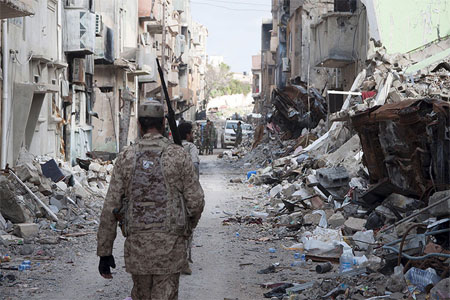
Afrasianet - Dozens of troops and civilians have reportedly been slaughtered in an attack on an airbase in southern Libya. The attack was blamed on the militia backing the Tripoli-based government of National Accord (GNA), which denies that it sanctioned the carnage.
The attack unfolded Thursday afternoon at Brak Al-Shati airbase, which since December has been under control of the Libyan National Army (LNA), rivaling the government in Tripoli. LNA, headed by General Khalifa Haftar, does not recognize the authority of the GNA and is linked to the rival House of Representatives (HoR), the country’s elected legislature, which operates from the city of Tobruk on Libya’s eastern Mediterranean coast.
The so-called Third Force militia, hailing from the city of Misrata, which is loyal to the UN-backed government of Prime Minister Fayez Al Sarraj, launched an attack on the airbase as the LNA soldiers were returning from a military parade held there. The servicemen were not able to offer much resistance as they were unarmed, LNA spokesman Ahmad Al-Mimari said in a statement on Friday, as cited by AFP.
“Most of them were executed,” Al-Mimari said.
Misrata State Council member Begassem Igzeit called the killings an “irresponsible and heinous crime against Libyans.”
Medical officials at a local hospital said that people killed in the bloodshed died of a variety of causes, having their throats slit by militiamen, succumbing to burns or due to being run over by military vehicles.
Among those caught in the melee were also “innocent civilians,” Al-Mimari said, who lived nearby or were employed at the base.
Reuters reported Thursday that at least 60 people died in the attack, however, unverified reports of a much higher death toll were already circulating.
Third Force commander Mohamed Gliwan claimed responsibility for the attack, arguing that his people “liberated the base and destroyed all the forces inside,” in an interview to Lybian Al-Ahrar TV, as cited by Reuters.
As a pretext to the attack he cited “suspicious movements” inside the base allegedly detected by the militiamen, which he said could have threatened their positions.
The blatant attack was condemned by the parliament in Tobruk, which denounced it as “a cowardly terrorist attack by Al-Qaeda armed groups and militias allied with the so-called government of national accord on Brak Al-Shati air base,” as cited by Xinhua.
However, Tripoli denied it had played any role in plotting the attack. On Friday, the government’s presidential council chaired by Al Sarraj announced the suspension of defense minister Mehdi Albergta and ordered to launch an investigation to “identify those responsible for the breach of truce and ceasefire,” as cited by Sky News Arabia.
The council said the attack led to the military escalation, which is hindering reconciliation.
The new outbreak of violence in Libya, which has been embroiled in a civil war since the toppling and subsequent murder of late leader Muammar Qaddafi in 2011, was condemned by the Head of the United Nations Support Mission in Libya (UNSMIL), Martin Kobler, who said he was “outraged” by the mass executions of people at the airbase.
“Summary executions targeting civilians constitute a war crime, which may be prosecuted by the International Criminal Court,” Kobler said, urging “all parties to condemn this attack and not to allow it to undermine efforts to find peaceful political solutions.”
Libya has been divided between the Tobruk-based parliament and the UN-backed government in Tripoli. The power vacuum in the country, which emerged after the disastrous NATO-led military intervention in 2011, has been exploited by militant groups, including Al-Qaeda and Islamic State (IS, formerly ISIS, ISIL) offshoots. Those in turn have been lending support to some of the extremist factions within the country.
The new spiral of violence threatens to undermine a fragile peace deal, reached last month between Tobruk and Tripoli authorities in Rome that was brokered by Italy. The deal, hailed as a breakthrough at a time, brought hope of a political solution to the bloody conflict, which has also been playing a major role in fueling the ongoing refugee crisis gripping Europe.

